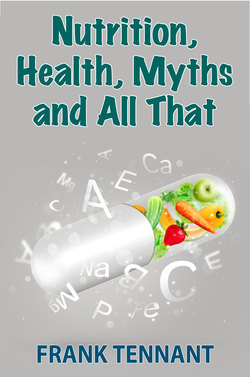Читать книгу Nutrition, Health, Myths and All That - Frank Tennant - Страница 5
NUTRITION AND DISEASE
ОглавлениеThe WHO (World Health Organisation) has not been able to find a degenerative disease that is not linked to nutrition.
The ‘Agricultural Age’ commenced in the Fertile Crescent of present-day Iraq about 12,000 years ago. In South America it started 5000 years ago and in Northern Europe some 2000 years after that. We have not had time to adapt to these rapid changes.
In 1788 the agricultural age started in Australia. We can see the deleterious effects of this to the health of the aboriginal peoples. This has compounded in the last hundred years with the advent of food processing.
Dr.Philip Goscienski, author of “Health Secrets of the Stone Age”, writes: Since the beginning of the Agricultural Revolution …… not even an eye-blink within the cosmos …. our body chemistry has not had time to adapt to foods such as processed cereal grains and dairy products. It’s even less likely for us to have adapted to the foods that have become available in the past few generations.
When cereal grains replaced fruits, vegetables and animal protein, the average persons stature diminished by several centimetres and his lifespan by several years. Infant mortality climbed. Bone and tooth disorders increased as did infectious diseases and iron deficiency anaemia. In addition we lost 10% of our brains.
Oral health influences our overall health. DNA samples show that 5000 years before the Agricultural Revolution reached Northern Europe the bacterial ecosystem found in the mouths of our meat-eating ancestors benefited from diversity. Since the start of the Agricultural Revolution there has been a decrease of between 30-40% in this rate of diversity with a much greater representation of disease-causing bacteria. Apart from the mouth oral bacteria is also associated with diabetes, heart disease and some cancers.
Heart disease was first diagnosed in 1908. Now one in three Australians suffer from heart disease, diabetes, and, or cancer. This is apart from problems like alzheimer's, dementia, autism, chronic fatigue syndrome amongst other degenerative ills.
What’s happened?
Let me remind you of the summary from “The Stuff Mans’ Made Of”: ‘the incidence of degenerative diseases can be linked to modern agricultural practices and food manufacturing’.
As a result of these practices it has been estimated that some foods currently contain as little as 20% of the nutrition available to our ancestors three or four generations ago.
For many decades numerous diets have been introduced to attempt a remedy for this increase in degenerative diseases. One of these was the low fat diet.
This diet was originated by a Dr Ancel Keys. As a result of his population studies he claimed there was a link between heart disease and saturated fat consumption. We have also been advised that reducing saturated fat consumption is necessary to reduce weight.
However, when I looked at the Australian statistics I found that since the start of the low fat diet the incidence of cardiovascular diseases had nearly trebled, deaths from cancer had increased by a third and we are experiencing an obesity epidemic.
It did not seem credible that there could be a link between saturated fats and heart disease.
Even though Ancel Key’s research has been shown to be badly flawed the low fat diet continues to be promoted.
During an ABC interview in August 2011 a professor with expertise in nutrition quoted a recent fifteen year study which showed there was no link between saturated fats and heart disease. Yet in the same breath he advised against using coconut oil - presumably because of its ‘saturated fat content’. More on that later.
I then looked at food consumption in Australia to find out what may have changed: In the last half of the last century, sugar in manufactured foods doubled; the consumption of vegetable oils increased by 84% and butter consumption slumped to a fifth of what it had been 70 years before; the consumption of fizzy drinks almost trebled and breakfast foods increased by 60% with a surge in the last 20 years.
Breakfast foods have a high level of sugar and the level in fizzy drinks is, what one might call, toxic.
During this period the consumption of beef, a major source of saturated fats, dropped 40%.
This indicated to me that our health problems were more likely to be linked to sugar and vegetable oils than saturated fats.
Let’s examine how this has influenced food manufacturers.
